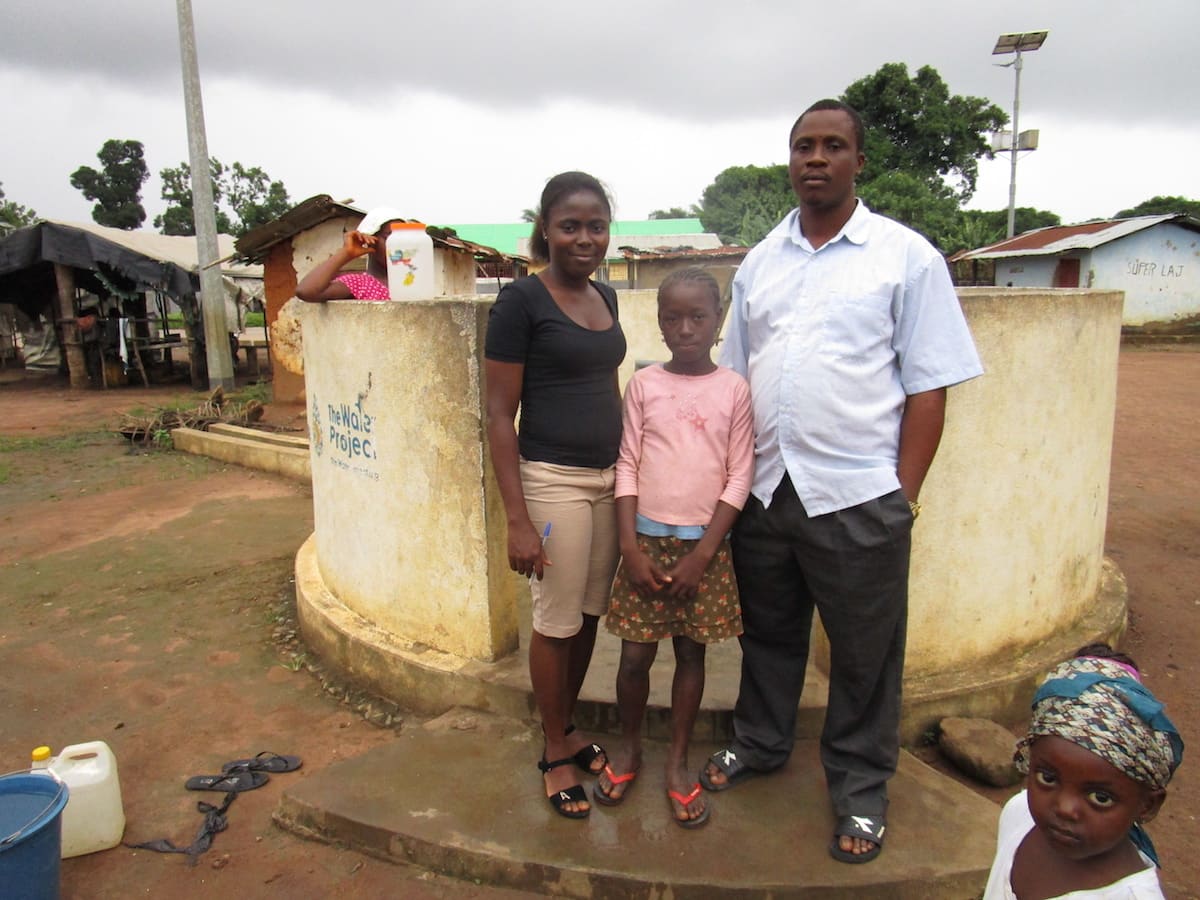Ebola’s Impact
Ebola has been a tragic reality for the people of Sierra Leone over the last two years. Though considered stable at the moment, the country is still very cautious.
Our teams have remained safe and are on the front lines of Ebola prevention through this water, hygiene and sanitation program. Your support acknowledges and celebrates their selfless work and bravery.
The entire team continues to express their gratitude for your support of communities in Sierra Leone, and we can't wait to celebrate safe water together!
Welcome to the Community
The Suctarr Community is home to 593 people from 56 different households. (Editor’s Note: While this many people may have access on any given day, realistically a single water source can only support a population of 350-500 people. To learn more, click here.)
Nothing seems normal about this community, filled with hospital staff and soldiers. Children are constantly crossing a high traffic street filled with buzzing motorcycles to fetch water from the hospital yard. You can often hear the cries of family members visiting the government hospital. The diversity of tribes, military personnel, nurses, lab technicians and pharmacists makes this community an ideal candidate for a new well project. It is always a scary thing for children to enter the hospital grounds to fetch water: Children as young as ten years of age face the danger of being exposed to numerous types of bacteria.
On a typical day, Muslims and Christians wake up at 5:30am for bucket baths and then go to morning prayers. The children also begin their days at 5:30am to prepare for school. They are released from classes at 2:30pm. Once children get back home, they help out with domestic chores.
Water Situation
The only water source for this community is located inside the government hospital. It is a protected, hand-dug well fitted with an India Mark II hand pump. You will seldom find an adult using the pump; children are primarily responsible for fetching water for their families. These little children must stand on a six-inch block just to reach the hand pump. They tote a five-gallon container full of water back home, where it is separated by purpose: drinking or domestic. Water reserved for drinking is kept up on a table and covered.
The water from this well is safe for drinking, but there is a gross overuse of the pump. Children must wait for their turn to fetch water after they cross a dangerous, busy street. Because this is the only water source, there are still hundreds of community members that suffer from a shortage of safe drinking water. Reports of cholera and typhoid are common.
Sanitation Situation
100% of households have pit latrines that are in above average condition for a Sierra Leone community. This is because most community members have professional positions and thus earn enough money for better living quarters. You can find clean porcelain in both the latrines and bathing rooms, and some are even tiled! There is no open defecation here.
Over 75% of households have helpful tools like dish racks and clotheslines for drying belongings.
The members of this community who work at the Lungi Government Hospital have had extensive hygiene training by our organization and other NGOs who supported the hospital during the Ebola epidemic. They are still practicing what they learned!
Plans: Hygiene and Sanitation Training
Community members will be trained for three days, three hours a day on hygiene and sanitation. The facilitator will use the PHAST (Participatory Hygiene and Sanitation Training) method to teach topics including:
- How to build a hand-washing station
- The importance of having a dedicated kitchen
- Having helpful tools like dish racks, clotheslines and animal pens
- What makes healthy and unhealthy communities
Plans: New Borehole
We were contacted not only by the community, but also by the hospital, both complaining of the overuse and business at their well. This well, located inside hospital grounds, is intended only for patients during the day, but the community begins lining up outside with their containers before 5pm! They are not allowed inside the compound to fetch water until 6pm, allowing the patients an opportunity to fetch their water first.
Having a new well on the other side of the street will save children from the dangers of both crossing a busy road and entering a hospital treating the ill. The community has chosen #27 Government Hospital Road as the location for this new borehole, across from the busy hospital itself.
We will be using an LS200 drill rig, equipped with 4000psi drilling power. It is safe, mobile, and easy to operate. Once we drill and line the well, construct the well pad and wall it in, we will fit the well with an India Mark II pump.

 Borehole Well and Hand Pump
Borehole Well and Hand Pump
 Rehabilitation Project
Rehabilitation Project





















